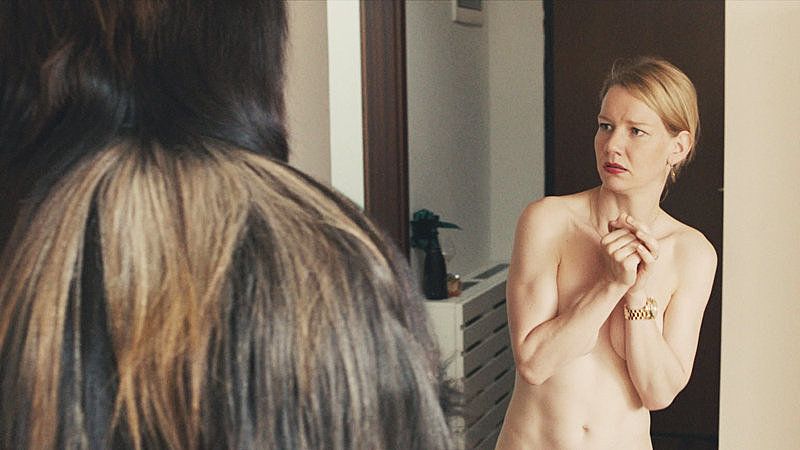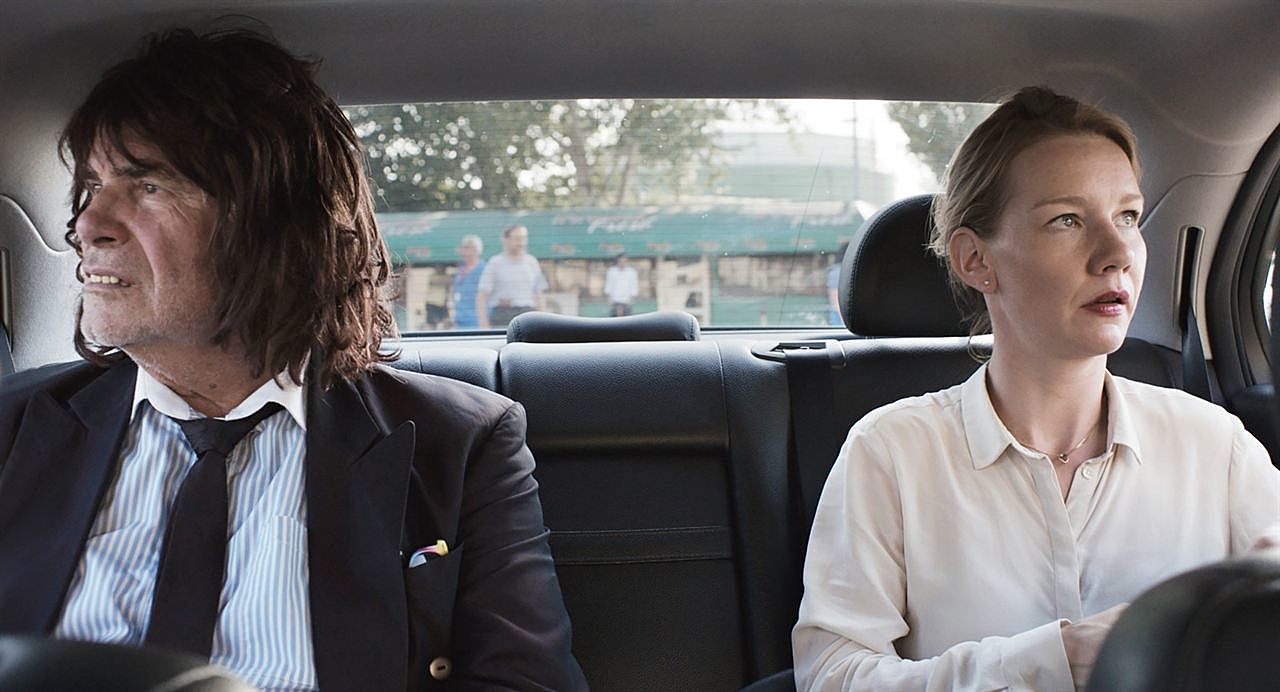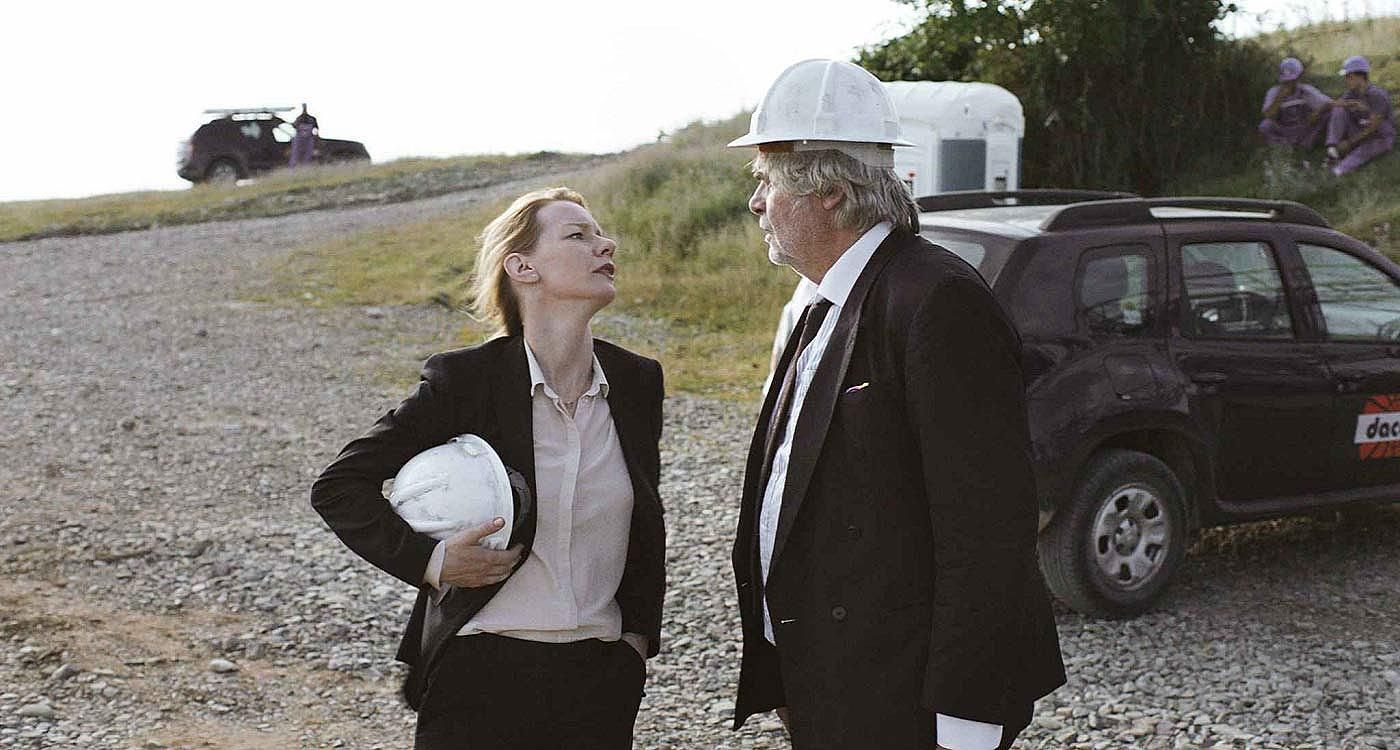Review: Toni Erdmann
An exquisite and gleefully modern German ‘reunification’ tale, Toni Erdmann brings together a daughter who’s forgotten how to laugh and a father who doesn’t know when to let the joke die.
An exquisite and gleefully modern German ‘reunification’ tale, Toni Erdmann brings together a daughter who’s forgotten how to laugh and a father who doesn’t know when to let the joke die.
When was the last time you found yourself laughing for any length of time in a German film? Personally, I’m struggling to remember. You don’t have to look far to find decent German drama: the work of Rainer Werner Fassbinder (Ali: Fear Eats the Soul, The Marriage of Maria Braun, World on a Wire, etc.) and, more recently, Christian Petzold (Barbara, Phoenix, etc.) spring to mind. But German comedies (at least ones that make it to our cinema screens) seem few and far between.
A few years ago, I had a long discussion with a German friend about what characterises a stereotypically ‘German’ sense of humour. He summed his thoughts up by saying, “You might describe it as...obvious. We’re not subtle in our humour, for the most part.” And yet, one of the one of the funniest comedies of the year, Toni Erdmann, happens to have been written and directed by a German filmmaker. Using an arresting blend of deadpan, slapstick, and absurdist humour, director Maren Ade ably investigates prickly family dynamics through a curtain of melodrama.
Winfried Conradi (a convincingly scruffy Peter Simonischek) spends his days visiting his mother, teaching music to school students, and pranking courier company delivery staff. Turns out this last trait isn’t limited to retail transactions; he also pranks his despairing mother as well as the staff at school. You might say that tomfoolery is Winfried Conradi’s primary means of negotiating an increasingly disconnected world by attempting to slip past ever-present social barriers.
At her (early) birthday celebration, we're introduced to Winfried’s daughter, Ines (Sandra Hüller), who appears to be her father’s highly-strung opposite. Employed as some kind of consultant in a German-Romanian firm based in Bucharest, it’s quite clear that not only is their father-daughter relationship quite distant, but that Ines finds all family connections something of a trying necessity. In their small exchange, Winfried jokes with his daughter — in a way that seems longstanding — that, as he didn’t realise this was a birthday celebration, he’ll drop her a present the next time he’s in Bucharest. Ines views this as a poor joke, because what else would she expect from her frivolous father? For him to actually turn up? It's a shock, then, when good to his word, Dad appears out of the blue at Ines’s workplace, where she, in the company important clients, studiously ignores him, instead sending out an assistant to make arrangements for them to meet up later.
So if the main characters have been established as Winfried and Ines, who the hell is Toni Erdmann? Well: he’s an occasionally-adopted alter ego of Winfried, who the old man pulls from his bag of tricks in an attempt to provoke his daughter out of her anxious, work-fixated headspace. Whereas Winfried is — as he likes to repeat often, mimicking a disparaging remark made early on by Ines — “only the [dishevelled] father”, prominent-toothed Toni is anyone he needs to be. One minute he's a besuited yet dishevelled Life Coach to the rich and famous and the next, he's a dishevelled German Ambassador to Romania, and so on. Sure, the father may be an inveterate prankster, but he’s using the means at his disposal to try and truly connect with his daughter and provide her with what he considers some much needed perspective (though, as Ines points out in one cutting interchange, her father’s ‘acting out’ is actually in service of his own grief at a recent loss). It’s a credit to writer-director Ade that we get the feeling that both of these things are equally true. The dramatic scope of Toni Erdmann is both immersive and expansive in a way similar to that of Kenneth Lonergan’s underseen 2012 tour-de-force Margaret. Neither film has a particularly complicated narrative, which leaves them free to explore character and relationship in depth — a definite strength of each feature.
Toni Erdmann’s two leads play on the classic comedy double act — think Abbott and Costello or Laurel and Hardy — with Winfried/Toni as the ‘funny man’ and Ines as the (oh so) ‘straight woman’. Both Simonischek and Hüller bring a discernable relish to their respective roles with Hüller in particular playing Ines so down the line that as she's pushed into more and more absurd situations, scenes play out with an exquisite level of awkwardness. The film also includes elements of physical comedy, both in terms of costuming — Toni is a character conscientiously outfitted and performed with glee by Winfried — and even in the occasional use of a cheesy old prop (there's a cleverly scripted deployment of a whoopee cushion at one point, which sounds like a dud move but turns out to be doubly funny because as well as being genuinely amusing in the moment, it's also used as a smart-arse reference by ‘Toni’ to an earlier uncomfortable discussion between father and daughter). On top of this, Ade layers a more modern ironic sensibility, though the film never goes so far as to feel detached or coolly observant as do some other comedies of the day such as Yorgos Lanthimos’s The Lobster (also fantastic) or Jared Hess’s Don Verdean (relatively abysmal).
This is not merely wry comedic posturing for its own end, with Toni Erdmann, Maren Ade adroitly dissects the all-too-familiar paradox of the strained yet significant ties of the familial bond. Both father and daughter come in for close scrutiny as the filmmaker unpacks their similarities and differences, selfishness and better qualities. Ade’s writing and characterisation is so rich, and surprising, that the film carries its lengthy-ish runtime with ease. There are so many moments of genuine warmth and delicious awkwardness [1] that it’s easy to forget that these are two actors and not actual family members.
Toni Erdmann feels like a significant step along the filmmaking path from Ade’s previous directorial effort, Everyone Else, some seven years back in 2009. That earlier feature also explored relationship dynamics but in the framework of a romantic drama where a couple find their relationship under pressure. Between the two films, you start to recognise the filmmaker’s ongoing interest in actor physicality: the camera zeroing in on the way a person dances or moves from place to place, the way they slouch down on a bed or lounge chair, but Toni Erdmann feels like a freer film from a director who's trusting their instincts in a grander way, and it works. One can only surmise that the intervening years spent co-producing the films of contemporary Portuguese maestro Miguel Gomes (Ade worked on Gomes’s Tabu and the Arabian Nights trilogy as well as his documentary short Redemption) has had an impact on her work, too: one obvious parallel would be the socio-political aspect of Toni Erdmann, something central to Gomes’s cinematic output. In Toni Erdmann, Ade explores the impacts of global business on poorer countries. It is not by chance that Ines works in Romania. The camera and characters roam casually about both the developed and less developed parts of the city and surrounding countryside, and there's a shot where Ines, attempting to relieve some stress, goes out onto an office building balcony and ends up staring into the backyard of a slum-like tenement building. It turns out her firm is consulting on behalf of a multinational company involved in a local oil drilling project and are looking into the possibility of outsourcing labour to cut costs. It's not difficult to see the local human cost of that business decision inhabiting the margins of many scenes.
Though these wider ideas are approached both directly and indirectly in the narrative, it's never with a heavy hand. Ade proves adept at subtly weaving an array of more serious thematic threads around a strong comedic core. And the comedy keeps coming — though at times with a bitter edge, like when Toni, now in the meta-role-within-role of energy logistics consultant, jokes his way through a local oil drilling operation leading to unintended negative consequences for some workers and ending in an unexpected toilet stop. It's also worth mentioning that these thematic ventures never come at the cost of the film’s central exploration of Ines and her father's relationship, and Ade eventually brings things to satisfyingly untidy close. Father and daughter are to some degree reunited, but we accept that — as in our own lives — not all families will be dining together every other week, and that’s okay, so long as we can connect meaningfully when it counts.
The Pantograph Punch are proud to be sponsoring Toni Erdmann at this year's New Zealand International Film Festival
Auckland • Wellington • Christchurch • Dunedin




